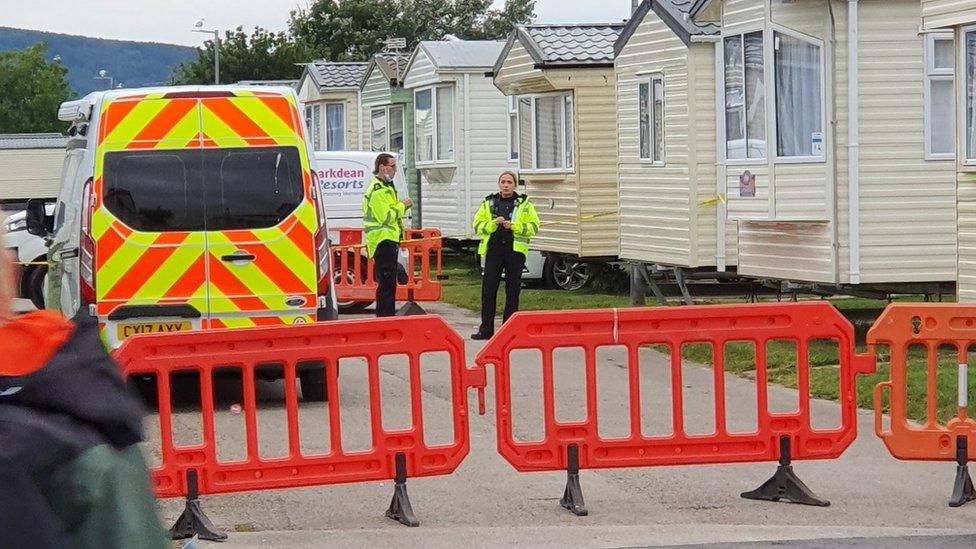Matthew Selby: Risks posed by sister killer were missed - report
- Published

Amanda Selby was killed by her brother while they were on holiday in north Wales with their father
Authorities underestimated the risks posed by a man who killed his sister at a holiday park, a report has found.
Matthew Selby, 20, choked 15-year-old Amanda Selby to death in north Wales in July 2021.
He admitted manslaughter due to diminished responsibility and in March his sentence was increased to life.
A Tameside Safeguarding Children Partnership spokesperson said it had taken "learning on board" and "put action plans in place".
The Department for Health and Social Care said it was putting more money into mental health services.
Selby, of Windermere Crescent, Ashton-under-Lyne, Greater Manchester, was originally jailed for five years in December 2022.
The Court of Appeal later ruled that he should serve life with a minimum term of three years and four months.
Mold Crown Court was told Selby had autism and mental health conditions that triggered the incident.
Amanda was killed while they were at Ty Mawr holiday park in Conwy, on holiday with their father Anthony.
A serious case review into Amanda's death commissioned by Tameside's Safeguarding Children Partnership revealed that social services knew about Selby's "escalating violent and aggressive behaviours", but underestimated the risk he posed to his sister.
Stabbed with scissors
The report said the family was known to various agencies since 2008, 13 years before Amanda was killed.
It said Selby was known to be regularly attacking members of his family, with a GP told in 2020 that he was hitting his father "five to six times a day".
He stabbed his sister with scissors in 2015, but the review said the risk of physical harm to Amanda did "not appear to have been fully assessed" by health and social care professionals.

Matthew Selby was initially sentenced to five years, which was later increased to life in prison
The report stated that the family separated in 2017 due to Selby's increasing violence, from which point Amanda lived with her mother while her brother lived with his father.
A year later in 2018, Matthew Selby's case was closed by social services.
The review raised concerns that the case had ended too soon. It said authorities relied too much on the family reporting improvements and found there was a "complacency among agencies".
In addition, the report authors identified a number of "missed opportunities" for further investigation, as well as a "considerable delay in getting help for Matthew with his autism".
It said that even after being diagnosed, there appeared to be very little care and support provision available for people of his age.
'Critical' wait for help
Clare Hughes, criminal justice manager at the National Autistic Society, said the issue was not uncommon.
She said: "We can't comment on the individual circumstances of this tragic case. However, we know while the vast majority of the UK's more than 700,000 autistic people are completely law abiding, not getting the right support can all too often lead young people and their families into total crisis."
Ms Hughes said waiting times for a diagnosis assessment were "critical" with "more than 125,000 children, young people and adults currently waiting for an assessment".
"On top of this, years of social care crisis, lack of mandatory autism teacher training, and huge struggles to get mental health support can all contribute to young people and their families finding it harder and harder to manage," she added.

Amanda Selby was killed by her brother at a holiday park
A Tameside Safeguarding Children Partnership spokesperson said: "This is an extremely tragic case and our thoughts are with everyone affected. We have met extensively with the family to support them and are aware of their requests for privacy following significant media interest.
"The partnership commissioned the review as part of our usual statutory process to identify any learning required and to be open and transparent about the circumstances. Where learning has been identified we have taken this on board and put action plans in place to address.
"The review was shared with the National Child Safeguarding Practice Review Panel who considered it a good, focussed and succinct review which clearly set out the relevant learning. It was also shared with the coroner at the inquest, who made no further findings."
The Department of Health and Social Care said it was investing £2.5m to improve autism diagnosis and the speed at which people are seen and assessed.
It added that it would be increasing investment into mental health services by at least £2.3bn a year by 2023/24 so that an additional two million people could get the support they needed.
Related topics
- Published8 March 2023

- Published1 August 2021

- Published7 February 2022

- Published31 July 2021
